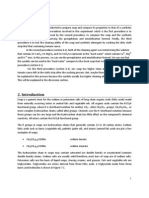Axyl Kent Rubin Galacio - BSMT-1A - GEC STS
Axyl Kent Rubin Galacio - BSMT-1A - GEC STS
Uploaded by
Axyl GalacioCopyright:
Available Formats
Axyl Kent Rubin Galacio - BSMT-1A - GEC STS
Axyl Kent Rubin Galacio - BSMT-1A - GEC STS
Uploaded by
Axyl GalacioOriginal Title
Copyright
Available Formats
Share this document
Did you find this document useful?
Is this content inappropriate?
Copyright:
Available Formats
Axyl Kent Rubin Galacio - BSMT-1A - GEC STS
Axyl Kent Rubin Galacio - BSMT-1A - GEC STS
Uploaded by
Axyl GalacioCopyright:
Available Formats
Axyl Kent Rubin Galacio – BSMT-1A – GEC STS
Guide Questions:
1. Why is nanotechnology likened to creating a statue out of a pile of dust?
Nanotechnology is an advanced field of science that, as of now, is impossible to work with due
to its small size. For many years, we humans have been attached to the method of building
things from top to bottom, just like a sculptor chipping away bits from a block of stone to create
a statue. However, nanotechnology is quite different because, whereas sculpture is built from
the top down, George Tulevski describes nanotechnology as a technology that would be built
from the bottom up and that it would be like building a statue out of a pile of dust. One of my
realizations concerning the statement "nanotechnology is likened to creating a statue out of a
pile of dust", is that this is a good way to describe how nanotechnology is a totally a different
field of science and that its development would require alternative methods that are quite
different from what we’re used to.
2. What science governs nanostructures? Why is it different?
Building from the ground up may be an unfamiliar thing to us because, as far as we know,
people just don’t build from the ground up, like building a statue from the sand. However, the
majority of us are not aware that "ground-up" building methods are already everywhere because
this method of building is what mother nature has been using for millions of years. So if nature
was able to create things from the ground up, it would make sense if we used the same tool that
nature has been using, and that is chemistry. Chemistry is the science that will govern the
development of nanotechnology and the reason why it is different is that, unlike any other
sciences and building methods, this type of science is concerned with building structures and
materials starting from the smallest molecules up until the biggest formations such as rocks and
trees.
3. Why is nanotechnology a difficult science
Nanotechnology is a difficult science for mainly two reasons. One is that developing
nanotechnology would mean dealing with small, tiny objects and arranging if not billions, then
millions of tiny particles. It would also mean that small molecular tweaks could alter the whole
program of nanotechnology, and we would also consider the numerous fields in which this
technology is badly needed, which would mean that the scientists still have a lot of work to do.
The second reason is that the development of nanotechnology would require a different and
unique field of science that is not aligned with what the current scientists and experts have been
incorporating in building objects given that the current trend was building things from top to
bottom.
4. What does nature show about building organisms bottom up?
When it comes to building structures, one of our mother nature's distinguishing characteristics is
that she builds everything from the ground up. Proteins are used by nature to create sea sand
templates. Moreover, nature is not crude like us; nature is elegant and smart, building with what
is available molecule by molecule and creating structures with complexity and diversity that we
cannot even begin to comprehend. Nature's bottom-to-top building method is very old, and we
can still see it today through observations of our surroundings.
5. How can chemistry help in nanotechnology?
Chemistry is the missing tool in the development of nanotechnology because it can be used to
guide objects around, including small objects that compose the nanotechnology. In the talk, the
speaker shared that in their lab, they have developed a chemistry that goes into the pile of dust
and nanoparticles and pulls out the ones needed. He also added that humans can then use
chemistry to arrange billions of particles into a pattern and build circuits that are faster than
anything before. The reason that chemistry is the science that would be vital in the application of
nanoscale objects of the same size as molecules is due to the possibility that if the scientists
were able to pull this off, they would use chemistry in arranging billions of tiny particles to build
nanotechnology.
You might also like
- Merriam-Webster's Vocabulary BuilderDocument19 pagesMerriam-Webster's Vocabulary BuilderCarlo Benton100% (1)
- StsDocument3 pagesStsLynn Michelle Gorospe60% (5)
- Project Report On NanotechnologyDocument26 pagesProject Report On NanotechnologyDeepak Jain76% (41)
- Metode PerancanganDocument56 pagesMetode PerancanganFyrmus MbeokNo ratings yet
- Micro Teaching SkillsDocument12 pagesMicro Teaching Skillsfunzz230% (1)
- Design BriefDocument6 pagesDesign BriefBalbir KaurNo ratings yet
- Roxas Claire B. Science Technology and Society 09 Activity 1Document1 pageRoxas Claire B. Science Technology and Society 09 Activity 1Eldrick Neil Reyes100% (1)
- Sts 2Document3 pagesSts 2kyungs ooNo ratings yet
- Introduction To NanotechnologyDocument19 pagesIntroduction To Nanotechnologymonil_bioteNo ratings yet
- Futurewithnano MVGTDocument8 pagesFuturewithnano MVGTenigmatic89No ratings yet
- Ijaiem 2012 12 23 029Document3 pagesIjaiem 2012 12 23 029International Journal of Application or Innovation in Engineering & ManagementNo ratings yet
- Nano TechnologyDocument66 pagesNano Technologydeepakkumar899286No ratings yet
- Nanotechnology - Academic Essay Assignment - WWW - TopgradepapersDocument14 pagesNanotechnology - Academic Essay Assignment - WWW - TopgradepapersTop Grade Papers100% (1)
- A Presentation Report On: NanotechnologyDocument15 pagesA Presentation Report On: NanotechnologySanjeev SinghNo ratings yet
- CSE NanoTechnology ReportDocument25 pagesCSE NanoTechnology ReportpraneethNo ratings yet
- ScienceDocument1 pageScienceHiezl Ness Gonzaga50% (2)
- Act FourDocument8 pagesAct FourRonalyn PaunalNo ratings yet
- How Nanotechnology WorksDocument13 pagesHow Nanotechnology Worksyass800% (1)
- Nanotechnology Thesis DownloadDocument8 pagesNanotechnology Thesis Downloadbkx3abyc100% (2)
- Nanotechnology in ConstructionDocument23 pagesNanotechnology in Constructionsnow_smoothiesNo ratings yet
- Nano Technology: Utkal UniversityDocument33 pagesNano Technology: Utkal UniversityShradha SubhadarshineeNo ratings yet
- What Is Nanotechnology?Document3 pagesWhat Is Nanotechnology?Najib Altawell100% (1)
- Emerging TechnologiesDocument12 pagesEmerging TechnologiesnahomgksbtNo ratings yet
- The Presence of Colloidal Nano Silica in Sandy Soils: A ReviewDocument11 pagesThe Presence of Colloidal Nano Silica in Sandy Soils: A ReviewNajibullahNo ratings yet
- Tech InnovationsDocument11 pagesTech InnovationsNathan DwyersNo ratings yet
- Seminar Report: Introduction To NanotechnologyDocument13 pagesSeminar Report: Introduction To Nanotechnologyyogesh sharmaNo ratings yet
- 444 Module Gen Ed 7 Science Technology and SocietyDocument27 pages444 Module Gen Ed 7 Science Technology and SocietyNis DancelNo ratings yet
- Univerdidad de Ganajuato Division de Ciencias Naturales Y Exactas Perla Galilea Robledo Acosta NUA: 773502Document2 pagesUniverdidad de Ganajuato Division de Ciencias Naturales Y Exactas Perla Galilea Robledo Acosta NUA: 773502Carlos De La RosaNo ratings yet
- Nanotechnology: The Bottom Up InsideDocument16 pagesNanotechnology: The Bottom Up InsideBinodanNo ratings yet
- Lecture 10-What Is NanotechnologyDocument2 pagesLecture 10-What Is Nanotechnologyhaydar şimşekNo ratings yet
- G4001A15Document19 pagesG4001A15gurkiratsingh013No ratings yet
- Nanotechnology: Emerenini Chibiko Esther 2018/ND/SLT/80523Document21 pagesNanotechnology: Emerenini Chibiko Esther 2018/ND/SLT/80523IonicNo ratings yet
- Nanotechnology-An Engineering Solution To Medical ProblemsDocument10 pagesNanotechnology-An Engineering Solution To Medical ProblemsdhivakargunalanNo ratings yet
- What Is NanotechnologyDocument6 pagesWhat Is Nanotechnologycharlotte FijerNo ratings yet
- Nanotechnology ListeningDocument2 pagesNanotechnology ListeninghuyNo ratings yet
- A Seminar Report: " Nano Technology "Document18 pagesA Seminar Report: " Nano Technology "Nishan TNo ratings yet
- Nano TechnologyDocument7 pagesNano TechnologyARVINDNo ratings yet
- NanotechnologyDocument5 pagesNanotechnologyapi-302903402No ratings yet
- Lecture 1-4Document20 pagesLecture 1-4bhawana.thakkar.bt.2021No ratings yet
- Nano Means Very SmallDocument3 pagesNano Means Very SmallkarthikkumarkrNo ratings yet
- 13 - NanotechnologyDocument3 pages13 - NanotechnologyJokateNo ratings yet
- Acknowledgment: UNIVERSITY For Providing Us A Chance To Complete This ProjectDocument26 pagesAcknowledgment: UNIVERSITY For Providing Us A Chance To Complete This Projectpattanaik ashutoshNo ratings yet
- NanoroboticaDocument4 pagesNanoroboticaAngie Choquehuayta AncasiNo ratings yet
- STS Module 10Document4 pagesSTS Module 10AeiaNo ratings yet
- Lecture Note 5Document42 pagesLecture Note 5Bereket YohanisNo ratings yet
- Nanotechnology in Civil Engineering: Submitted byDocument24 pagesNanotechnology in Civil Engineering: Submitted bygsudhanta1604No ratings yet
- Online Assignment: Presented By: Aji Varghese Optional: Natural ScienceDocument5 pagesOnline Assignment: Presented By: Aji Varghese Optional: Natural ScienceSumithra KrishnanNo ratings yet
- How Did The People in The Past Engage in Nanotechnology?Document2 pagesHow Did The People in The Past Engage in Nanotechnology?Alister KingNo ratings yet
- Reportnanocopy 1Document68 pagesReportnanocopy 1Chandrabali SahaNo ratings yet
- How Nano WorksDocument8 pagesHow Nano WorksdwivedishikhaNo ratings yet
- Group 3 Member SDocument11 pagesGroup 3 Member SMeigh SagandalNo ratings yet
- NanotechnologyDocument6 pagesNanotechnologyrishanecezarNo ratings yet
- Project Completion Certificate (15) - RemovedDocument32 pagesProject Completion Certificate (15) - RemovedraushananandraushanNo ratings yet
- The Nano World: A New Frontier: Brian MclayDocument3 pagesThe Nano World: A New Frontier: Brian Mclayfelize padllaNo ratings yet
- Nano Technology: Prof - DR P.Veeramani - Csir-CecriDocument44 pagesNano Technology: Prof - DR P.Veeramani - Csir-Cecriaruchellam100% (1)
- Dokumen PDF 25Document1 pageDokumen PDF 25Farhan FarhanNo ratings yet
- Kuya BongDocument7 pagesKuya BongPaul Smith100% (1)
- Nanotechnology A ReviewDocument4 pagesNanotechnology A ReviewSingh TanvirNo ratings yet
- CHAPTER I-Introduction To Nanoscience and NanotechnologyDocument27 pagesCHAPTER I-Introduction To Nanoscience and NanotechnologyMobeen MurtazaNo ratings yet
- Nanotechnologyin Oiland Gas IndustryDocument17 pagesNanotechnologyin Oiland Gas IndustryAl-Shargabi MohaNo ratings yet
- Systems at The Molecular Scale. This Covers Both Current Work andDocument3 pagesSystems at The Molecular Scale. This Covers Both Current Work andNagaraja Prasanna RassNo ratings yet
- Paper ReportsDocument2 pagesPaper ReportsPrincess IbañezNo ratings yet
- UntitledDocument7 pagesUntitledAxyl GalacioNo ratings yet
- Topic 6 Sexual Characteristics, Behaviors and Reproductive SystemDocument21 pagesTopic 6 Sexual Characteristics, Behaviors and Reproductive SystemAxyl GalacioNo ratings yet
- Topic 2 Me and My CultureDocument11 pagesTopic 2 Me and My CultureAxyl GalacioNo ratings yet
- Topic 1 Philosopher's View On SelfDocument16 pagesTopic 1 Philosopher's View On SelfAxyl GalacioNo ratings yet
- MicroscopeDocument3 pagesMicroscopeAxyl GalacioNo ratings yet
- Topic 3 Gec SelfDocument4 pagesTopic 3 Gec SelfAxyl GalacioNo ratings yet
- Chemistry Assignment #1Document1 pageChemistry Assignment #1Axyl GalacioNo ratings yet
- Implementation of Limited Face-To-Face in A Philippine State University Towards Effective Transition To Complete Face-To-Face (IMRAD)Document22 pagesImplementation of Limited Face-To-Face in A Philippine State University Towards Effective Transition To Complete Face-To-Face (IMRAD)Vale Andrew CabregaNo ratings yet
- A Soil ProfileDocument4 pagesA Soil ProfileValNo ratings yet
- CSIRO Location November 2011Document15 pagesCSIRO Location November 2011Ledies Dwi AgustinNo ratings yet
- BSA FinalExamDocument2 pagesBSA FinalExamjimboysapal9No ratings yet
- The Benefits of 3R For Our EnvironmentDocument2 pagesThe Benefits of 3R For Our EnvironmentRohmatullah RohmatullahNo ratings yet
- Soap and Detergent ExperimentDocument12 pagesSoap and Detergent ExperimentAkmalhakim ZakariaNo ratings yet
- OB CH OneDocument11 pagesOB CH OneEbsa AdemeNo ratings yet
- Judd-Ofelt Analysis and Multiphonon Relaxations of Rare Earth Ions in Fluorohafnate GlassesDocument7 pagesJudd-Ofelt Analysis and Multiphonon Relaxations of Rare Earth Ions in Fluorohafnate GlassesJose Carlos Paredes MálagaNo ratings yet
- Glencoe Science TextDocument30 pagesGlencoe Science TextNepoy Beltran EntendezNo ratings yet
- Introduction To Bet Isotherms PDFDocument19 pagesIntroduction To Bet Isotherms PDFLuana AndradeNo ratings yet
- Ict550 ProjectDocument13 pagesIct550 ProjectnailofarNo ratings yet
- Case of Fly Ash Brick (Fab) Sector in Cities of BiharDocument3 pagesCase of Fly Ash Brick (Fab) Sector in Cities of BiharNikhilNo ratings yet
- Aerodynamic Properties of BiomaterialsDocument7 pagesAerodynamic Properties of BiomaterialsKhushbu KumariNo ratings yet
- Osa SH25Document58 pagesOsa SH25EvowithducadosNo ratings yet
- COMMUNIQUE - 7thNCEHDocument12 pagesCOMMUNIQUE - 7thNCEHJoshuaNo ratings yet
- Problem Set 1Document6 pagesProblem Set 1nillzhillzNo ratings yet
- TPQ Climate Advisor FSL FS-02Document2 pagesTPQ Climate Advisor FSL FS-02Kashif ManzoorNo ratings yet
- Micro Teaching: Brief EncounterDocument28 pagesMicro Teaching: Brief EncounterparulchaubeyNo ratings yet
- II. From AGI To Superintelligence The Intelligence Explosion - SITUATIONAL AWARENESSDocument2 pagesII. From AGI To Superintelligence The Intelligence Explosion - SITUATIONAL AWARENESSubj41486No ratings yet
- Communication Studies 1a InstructionsDocument27 pagesCommunication Studies 1a InstructionsAbigail WilliamsNo ratings yet
- Codex UnderhiveDocument97 pagesCodex UnderhiveLucas Lobo100% (1)
- First AnnouncementDocument10 pagesFirst AnnouncementagusNo ratings yet
- Room No:B1-102: Department of Electronics & Communication EngineeringDocument4 pagesRoom No:B1-102: Department of Electronics & Communication EngineeringKrishnaNo ratings yet
- Recombinant DNA Technology LectureDocument50 pagesRecombinant DNA Technology LectureJean Carmelette BalalloNo ratings yet
- Lube Oil FulltextDocument97 pagesLube Oil FulltextRendy WiradharmaNo ratings yet
- Function, Limit, ContinuityDocument2 pagesFunction, Limit, ContinuityGautamNo ratings yet
































































































